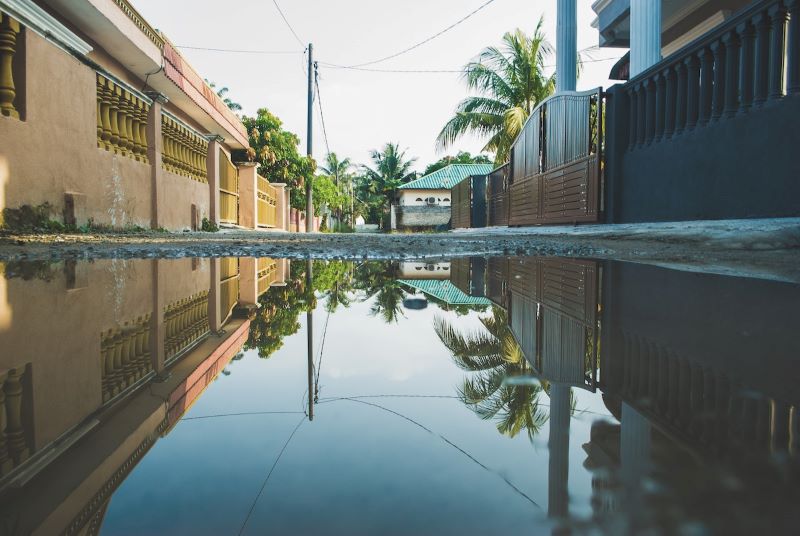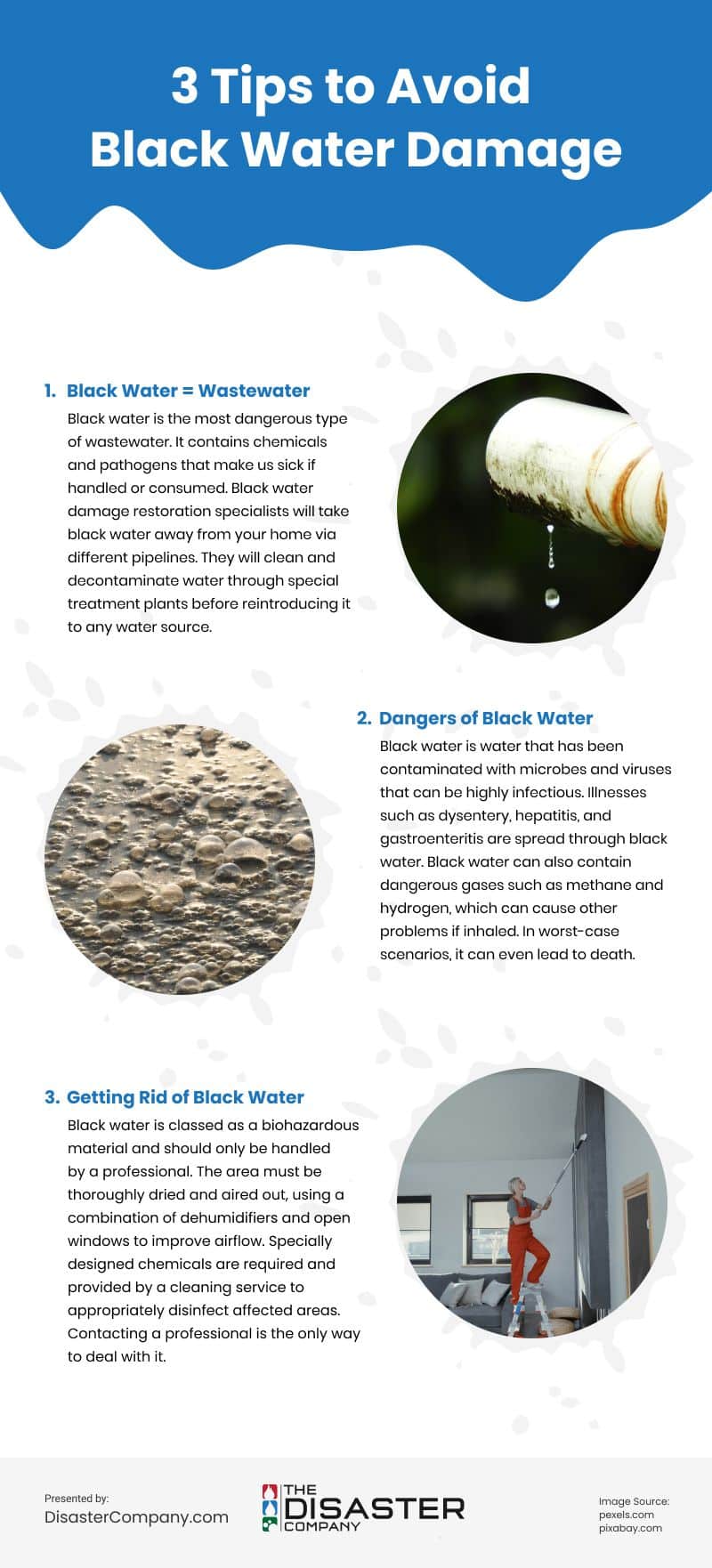Water damage is a nightmare for any Davis County homeowner. Aside from the fact that a leak or flood has occurred, dealing with the water damage in the home afterward can be much more devastating. Typically, water damage falls into one of the following three categories:
- Category 1: Clean water damage
- Category 2: Gray water damage
- Category 3: Black water damage
While no one wants any degree of water damage in their home, black water damage is the worst. If you ever find yourself with a flood or leak of black water, you must deal with it immediately.
So, what is black water damage? Read on to find out.
What is Black Water?
Black water is the most dangerous type of wastewater. It is the water containing other waste such as fecal matter, sewage waste, grease runoff, or stronger chemicals. Black water is severely harmful as it contains chemicals and pathogens that make us sick if handled or consumed. As such, you need to use caution safely when dealing with it.
Typically, Utah water damage restoration specialists will take black water away from your home via different pipelines than gray or clear water. Plus, they will clean and decontaminate water through special treatment plants before reintroducing it to any water source.
What are the Dangers of Black Water?
By its nature, black water’s dangers come from the contaminants inside it. The source is usually human waste and will contain microbes and viruses that can be highly infectious. Illnesses such as dysentery, hepatitis, and gastroenteritis are spread through black water. This is why black water must never be handled with unprotected hands, as even a small cut is enough to allow for infection.
Black water can also contain dangerous gases such as methane and hydrogen, which can cause other problems if inhaled. Methane gas poisoning leads to issues such as nausea, vomiting, headaches, dizziness, and respiratory damage. In worst-case scenarios, it can even lead to death.
Other rarer issues that can come with black water include dangerous drugs, chemicals, and algae. Adverse allergic reactions might occur in cases of drugs, while algae can cause vomiting and diarrhea.
Causes of Black Water Damage
Black water is taken away from the home with specific pipelines set up to keep it away from other water sources. As such, black water leaks or floods are a serious concern. Allowing black water to mix with gray water runoff is enough to risk major health concerns, so they must always be kept separate.
Since these pipes are kept and maintained separately, leaks are much rarer than with gray or clear water. However, there are two main reasons why black water might get loose:
- Natural disasters – Debris left from storms, floods, and hurricanes can cause serious damage to wastewater pipelines. Blockages in sewers or damage caused by fallen buildings, trees, or shifts in the ground can lead to black water pipelines splitting or bursting. Make sure to avoid and cordon off flooded areas in such cases.
- Human interference – Backups and overspills in pipelines can be caused by human error or deliberate misuse of water disposal. Buildups of improperly disposed waste will block pipes and send black water back to its sources, flooding homes. Grease and food waste from sinks can cause buildups if not kept clean.
Unfortunately, during a black water flood, assigning blame does little to resolve it. Often, the damage is deep in the pipelines, so you won’t be able to determine the actual cause until much later. Regardless, if you find black water in your home, it is important that you immediately begin to deal with it.
How to Get Rid of Black Water
First and foremost, you must remember that black waste is classed as a biohazardous material. This means that you should never, under any circumstances, handle it yourself, and only a trained professional should dispose of it. Even if there is only a small amount of water, do not attempt to deal with it yourself. For this reason, your first step should be to contact a local Davis County flood clean up team.
Removing black water requires personal protection equipment (PPE), including heavy-duty gloves, respirators, eye protection, and boots. Professionals use these to protect themselves from potential infections. Such equipment is also easy to dispose of after work is complete to prevent further contamination.
While you wait for your professional cleaners to arrive, you should block off the flooded area to prevent children or animals from exposure. If possible, lock off flooded rooms, and clear nearby spaces. It’s also a good idea to evacuate pets and other people from the residence until the job is finished.
Professionals usually gather water using pumps and wet vacs, depending on the amount of water. The area must be thoroughly dried and aired out, using a combination of dehumidifiers and open windows to improve airflow. When dry, the damaged area must be thoroughly cleaned and disinfected. Specially designed chemicals are required and provided by a professional cleaning service to appropriately disinfect affected areas.
Bacteria and chemicals can soak and cling to surfaces for a while, especially carpets and wood. In extreme cases, you’ll need to completely replace the carpets and examine the wood for any signs of mold or fungi.
You then need to repair and replace the cause of the leak – be it a broken pipe, a backed-up toilet, or structural damage that has allowed external water into your home. Even if this was caused by external sources, such as burst street pipes or sewer backwash, you must repair the source as it could potentially recur.
Black water is the most dangerous kind of waste that our households create. By extension, floods and water damage caused by black water are some of the hardest issues to resolve. The main takeaway is that you or your family should never handle black water. Contacting a professional is the only way to deal with it.
Infographic
Black water damage is a severe issue that can arise during floods or any water-related disaster. This refers to contaminated water containing harmful bacteria, viruses, and pathogens. Dealing with black water damage necessitates expertise from disaster companies, restoration companies, or clean-up firms, as the contaminated waters pose significant health risks for individuals. These companies possess all the equipment and knowledge required for safely removing this hazardous liquid and sanitizing the affected area; swift action is critical to minimize further destruction and health hazards.


